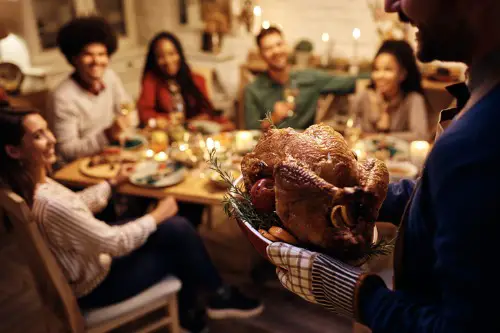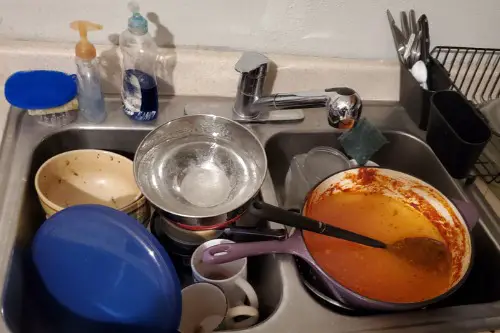1. Making Guests Wait Too Long for Food

Everyone knows that timing is everything at a dinner party. If guests arrive and spend an hour or more just nibbling on crackers, they’ll quietly start wondering when the real meal will appear. Hunger makes people cranky, and it also dulls conversation. Hosts often think they’re building anticipation, but guests are secretly clock-watching.
A long wait for food also creates an awkward power imbalance. Guests don’t want to seem rude by asking when dinner will be ready, so they sit there uncomfortably. Meanwhile, alcohol may start hitting on an empty stomach, which can make the vibe worse. A simple appetizer spread can save the night.
2. Serving Overly Complicated Dishes

It’s tempting to impress with a restaurant-level meal, but guests often feel uneasy when a dish looks intimidating. If it requires special utensils or instructions, people may second-guess how to eat it. That discomfort takes them out of the moment. Instead of enjoying, they’re worried about looking clumsy.
Complicated food can also dominate the evening. Guests want to chat and laugh, not dissect tiny elements of a deconstructed entrée. When the food feels like homework, people secretly wish for something simpler. Comfort food often lands better because it keeps the mood relaxed.
3. Running Out of Seating Space

Few things make guests feel more awkward than realizing there aren’t enough chairs. Suddenly, someone is balancing a plate on their lap, or worse, standing in the corner. That can create a sense of being less valued in the group. No one says it, but people notice.
Proper seating shows you’ve thought about everyone’s comfort. It also helps the flow of conversation, since no one is drifting around awkwardly. When people are physically comfortable, they’re more open socially. A couple of folding chairs stashed in the closet can prevent this quiet judgment.
4. Letting Dishes Pile Up Everywhere

A table full of empty plates and wine glasses can change the whole feel of a dinner. It signals to guests that things are getting messy and out of control. While no one expects spotless perfection, clutter quickly makes a space feel overwhelming. It can even kill the appetite.
Tidying as you go makes guests feel more at ease. It suggests you’ve got things handled, and it keeps the evening flowing smoothly. Guests may not mention it, but they notice when the host is drowning in dirty dishes. Clearing a few plates between courses can make a big difference.
5. Talking Only About Yourself

Great dinner parties thrive on conversation, but one-sided monologues make guests silently cringe. When a host dominates the discussion with their own stories, it leaves others feeling invisible. Guests might nod politely, but inside, they’re tuning out. No one came to sit through a personal lecture.
Balancing conversation is key. Asking questions shows genuine interest and helps everyone feel included. People remember the host who made them feel heard, not just entertained. A good rule is to listen as much as you talk.
6. Forgetting Dietary Needs

Few things make a guest feel more excluded than sitting at a table with nothing they can eat. When someone’s allergy or dietary choice gets overlooked, it can come across as careless. Even if they don’t complain, they notice. The rest of the table usually notices too.
Checking in beforehand doesn’t just avoid problems, it makes guests feel respected. Offering at least one inclusive dish is often enough. Guests won’t judge if you don’t cater everything around them, but they’ll quietly appreciate the effort. A little consideration goes a long way.
7. Overfilling Glasses with Alcohol

Refilling someone’s wine glass without asking can feel pushy. Guests may not want to drink more, but they don’t want to offend the host either. This unspoken pressure makes people uncomfortable, especially if they’re driving home later. Too much alcohol can also shift the tone of the evening fast.
Offering a refill instead of assuming gives people agency. It shows respect for their pace and preference. A good host provides water and non-alcoholic options just as generously as wine. Guests notice when you get this balance right.
8. Ignoring Temperature and Comfort

It might sound small, but a too-hot or too-cold dining room lingers in people’s minds. Guests won’t say anything because they don’t want to seem fussy. But secretly, they’re shivering in their chair or fanning themselves with a napkin. Comfort plays a huge role in how much people enjoy themselves.
A quick check of the thermostat before guests arrive can prevent this. Background details like lighting and airflow set the mood just as much as the food. When people feel physically comfortable, they’re more engaged in conversation. A cozy environment is part of the unspoken recipe for success.
9. Serving Everything at Once with No Flow

Piling all the food on the table at once can overwhelm guests. People don’t know where to start, and it often leads to dishes going cold too quickly. A meal without pacing feels rushed. Guests may not comment, but they’ll remember it felt a little chaotic.
Course pacing gives the night structure. It builds anticipation while allowing conversation to breathe between servings. Even simple pauses for salad or dessert make the evening feel more thoughtful. Guests quietly appreciate when a host has planned the rhythm.
10. Forgetting Music or Atmosphere

Silence at a dinner party can feel louder than any playlist. Without background music, every clink of a fork stands out, and lulls in conversation feel heavy. Guests might not say anything, but they’ll notice the awkwardness. Atmosphere matters as much as the food.
The right playlist fills gaps and adds energy without overwhelming. Candlelight or soft lighting works the same way. These little touches create a sense of occasion. Guests leave feeling like they attended something special, not just another meal.
11. Clearing the Table Too Abruptly

Whisking away plates the second someone sets down a fork can make guests feel rushed. It suggests the host is more concerned with cleaning than enjoying the moment. No one wants to feel like they’re being kicked out. Even if they smile politely, they notice.
A short pause between finishing and clearing lets conversation continue naturally. Guests feel free to linger without pressure. Dinner parties are about connection, not efficiency. Timing matters just as much in cleanup as in serving.
12. Ending the Night Without Closure

When the evening fizzles out without a clear wrap-up, guests leave a little unsure. They wonder if they overstayed, or if the host wanted them gone an hour earlier. That uncertainty sticks in people’s minds. No one enjoys feeling like they misread the room.
A warm close makes all the difference. Offering coffee or dessert signals the evening is winding down. Walking guests to the door with genuine thanks leaves a lasting impression. People secretly judge hosts who skip this final step.
This post 12 Dinner Party Habits Guests Secretly Judge but Never Mention was first published on Greenhouse Black.
